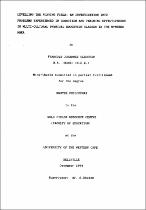| dc.description.abstract | This study investigated the social influences on the Physical Education curriculum. It then also became necessary to investigate the role of the Physical Education teacher in improving cognitive deficiencies in students. subsequently, the following hypothesis guided this study
"Cognition, in a Physical Education lesson, in a culturally diverse environment is determined by an interaction of teaching effectiveness and environmental factors". A major aim of the research was to determine what these factors are. The field of investigation was limited to the Wynberg area and concentrated on the cognitive aspects of Physical Education. ignoring the relationship between many other factors and teaching effectiveness and environmental factors. Questionnaires were used to test the hypothesis. One was sent to L2 schools, one to a college of education, and one to subject advisors. Ten male and nine female teachers from the secondary and primary schools in the area responded. The findings were grouped under the headings of "teaching effectiveness", "cognition" and "cultured". The findings from
one male and female college lecturer and the subject advisor's response were kept separate. The conclusion was made that the environmental factors that influence teaching effectiveness are; the workload of the teacher, professional development, social standing, salary remuneration, status of the subject, and teacher enjoyment. It was found that all these factors (except the teacher qualification improvement) are lacking in Physical Education in the Wynberg area. Teaching effectiveness and cognition in the field of Physical Education are negatively influenced by disagreement and misconceptions about these factors. A case was made for an understanding of curriculum and cognitive theory rather than practical coursework. A lack of theoretical training is also evident in teachers who dissociate cultural values from the Physical Education curriculum. A number of areas for research in the role of cognition in Physical Education were identified. This study advocated phi 16sr-real inquiry into the Physical Education curriculum and new curriculum content research at colleges. If Physical
Education is to be meaningful in the changing educational climate, so cultural and cross-curriculum activities must be investigated. | en_US |

